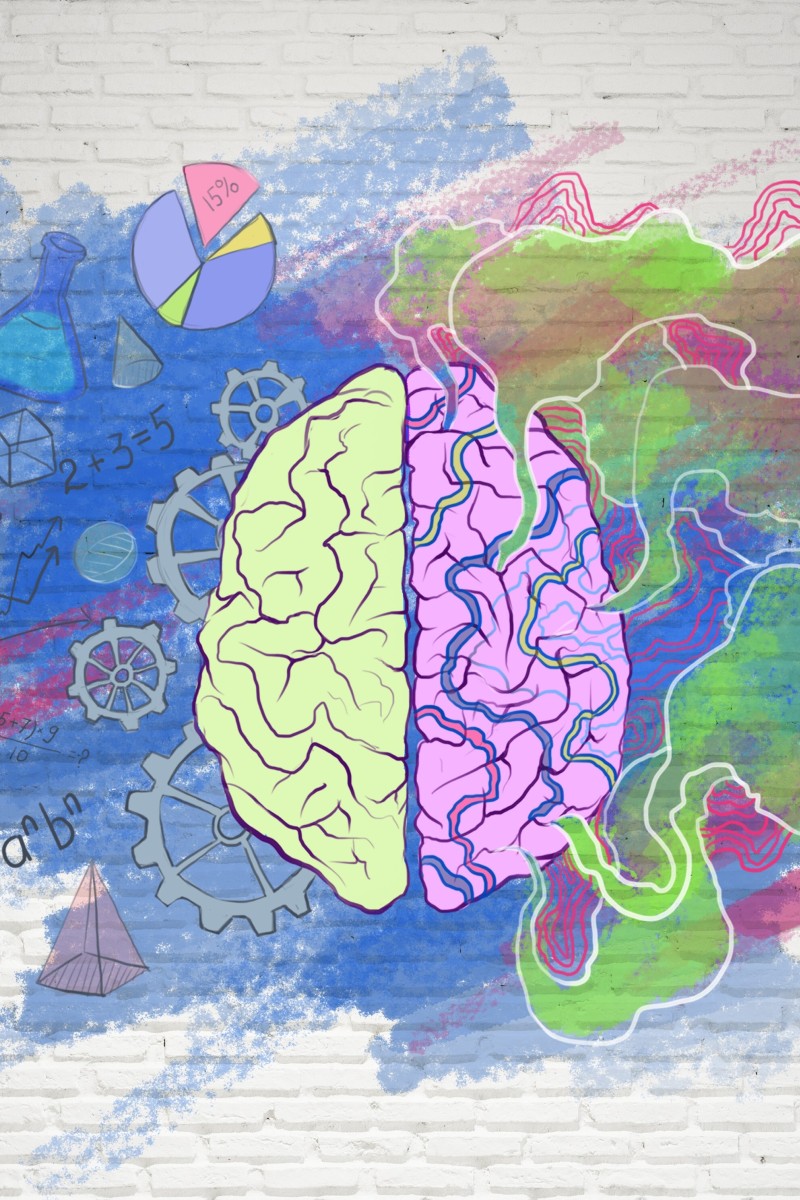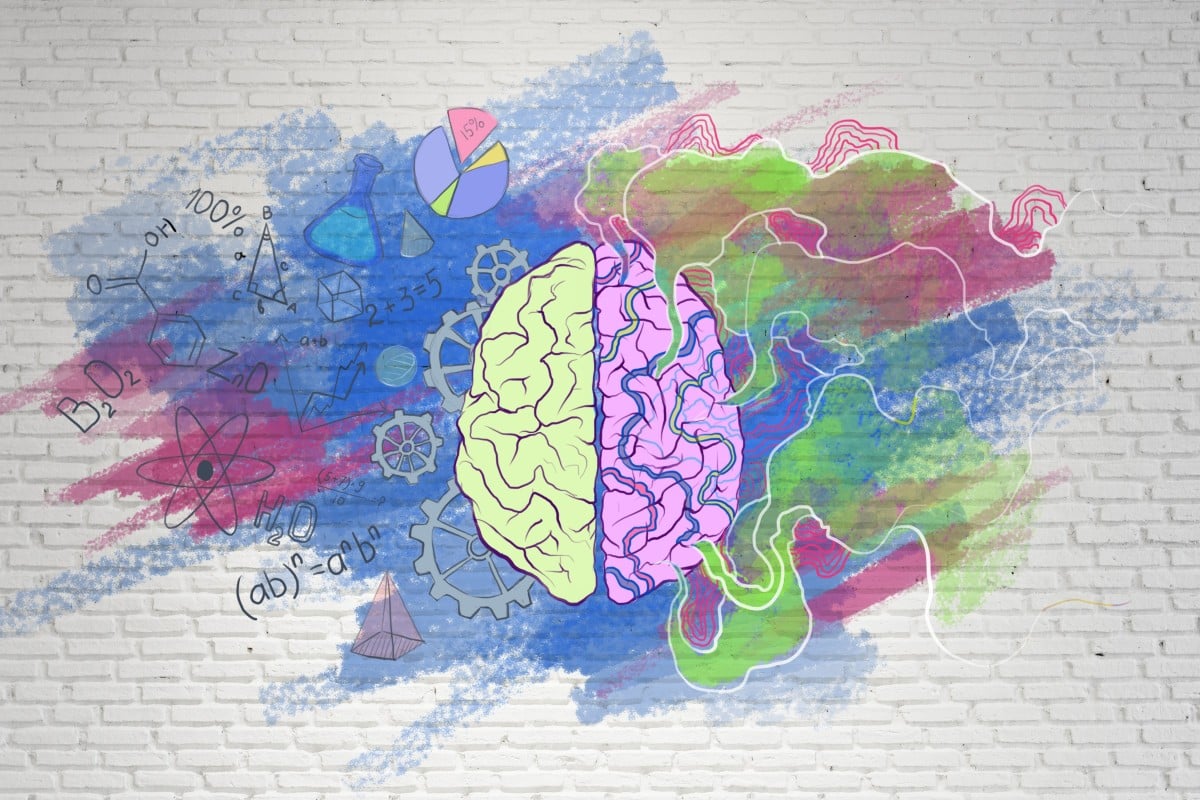
Bitcoin, Big Data and leung cha: The top entries from our latest Brain Game winners
- Melody Ma Jing-mao, 15, from Carmel Pak U Secondary School and Helen Ching, 12, from Diocesan Girls School are the winners.
- Take a look at their three best entries from the last two games.
 Congratulations to our latest Brain Game winners!
Congratulations to our latest Brain Game winners!Melody Ma Jing-mao, 15, from Carmel Pak U Secondary School
How would you explain bitcoin to an 80-year-old?
Granny: Hey little fellah, what’s Bitcoin? I’ve heard so many people talking about it.
Me: It’s a digital currency like Apple Pay which you cannot feel, touch, or place in your wallet. It exists in the computer, and is not controlled by banks or other organisations.
Granny: Not controlled by anything? On the computer? When thieves steal your Bitcoin, no one will be able to help you! If your laptop is stolen or broken, no one’s gonna help you! You’re going to lose everything!
Me: Calm down, Granny. Actually, the information about who owns Bitcoin is stored in multiple locations on a computer network, so everyone can verify it. And no one can claim to own Bitcoin that they don’t really own. So, even if your computer is stolen or it malfunctions, you don’t need to panic about the coins flying away.
Granny: This is what I want to know. Is it easy to make money with Bitcoin? I heard that a Bitcoin is worth about US$58,000!
Me: Erm … I can’t tell if Bitcoin is riskier than stocks or other types of investments, but this volatility can also make it more profitable. With Bitcoin, you could become a billionaire, or go bankrupt overnight. It’s quite dangerous, honestly.
Granny: Seriously? Oh dear, how do you know so much about Bitcoin? Are you going to buy some? I’m telling you ... you’d better not!
We don't totally understand Bitcoin either, so this was helpful.
What would Signal say to MeWe?
Signal: People aren’t satisfied with changing the privacy rules, they’ll leave WhatsApp and come to me. I’ll take his place soon, my big day is coming!!!
MeWe: Don’t celebrate too early. I’ll replace Facebook and do the same thing that Facebook did on WhatsApp, acquire you.
Signal: Never.
Have you tried Signal yet?
If you can make one example of Hong Kong cultural heritage last forever, what would it be and why?
Herbal tea, or leung cha. When my grandparents were young, many flats did not have air conditioners or TVs.
Tea shops would install a TV to attract customers. Many people would go in to buy a herbal tea, then hang around to watch television.
But today we all have TVs at home so fewer people visit tea shops. Also, some are put off by its bitter taste.
I really hope we can preserve this cultural icon, which some say can help cure a cold or sore throat.
Helen Ching, 12, from Diocesan Girls School
If you could redesign social media platforms, how would you do it?
These days, everyone is connected to some degree because of social media. We all enjoy using it, but some people have become addicted to it, becoming anxious at missing out on activities.
Adverts frequently feature inappropriate content or products, and cyber bullying can happen easily because a single post can reach many people in no time. Social media platform operators only care about making money from advertisers and increasing user numbers, so their lack of control of appropriate content has caused these problems. I would reform the industry so that social media operators must actively demonstrate social responsibility when conducting their business.
I’ll request major world governments to establish the World Social Media Organisation, WSMO, just like the World Health Organisation, to set standards for global social media platform operators to promote healthy online activity. Operators will have to join the organisation and become responsible for ensuring positive social media behaviour. Operators would have to filter inappropriate ads containing smoking, drugs, violence or sex.
Moreover, they will have to provide assistance for users who become addicts, detecting when they use the app excessively and sending them reminders or even suspending their accounts if needed.
Operators must also prevent cyberbullying. The platform must be able to detect threatening messages or images, and warn users not to send them, or risk having their account suspended.
Operators need to provide support to emotionally distressed users through the platform. The platform will scan messages, posts and statuses for extremely negative language. In response, it will show motivational messages, encourage users in need to talk to friends, and recommend social organisations for help and support.
The formation of the WSMO and establishing social responsibility standards will reform the industry so that social media platforms are no longer uncontrolled. The reform will help develop positive social connections and behaviour.
Inappropriate content can affect a large number of people. Social responsibility standards must be established to ensure the healthy sustainability of these platforms. Therefore, reforming the social media industry so that operators have to demonstrate social responsibility will ensure people are safe and comfortable, and the platform will continue to grow and have a positive impact on everyone it reaches.
We all enjoy using it, but some people have become addicted to it.
How would you explain the concept of ‘big data’ to people in the 1980s?
I would make a movie to explain the concept of big data to people in the 1980s. It would feature the Apple Macintosh, which revolutionised the computer industry at the time. It was the first personal computer with a built-in screen and mouse.
I would tell people that big data is an extremely large collection of information and statistics that helps with our daily lives – which is just as interesting as Macintosh’s evolution. I would also invite Steve Jobs to host my global movie premiere and introduce the idea of big data. I believe people would be very eager to find out more about it.
How would you explain the concept of ‘big data'?
What would America say to Hong Kong?
Dear Hong Kong,
Hey bro! Things are really chaotic here. My two old housekeepers are fighting to be Chief Housekeeper (they even call themselves President!). People here have elected their favoured housekeeper, which is supposed to be a good thing, but they have no clear preference.
The housekeepers’ fight has divided my homeland. They are accusing each other of wrongdoing, and worst of all, I don’t even like them: one’s an arrogant old man who is looking for a fight; the other is an even older man who can’t remember the name of his granddaughter! One day, he might even forget his own name!
With Americans going to war against each other, I’m terribly worried. They used to be united, and were willing to accept each other’s opinions. I seriously hope that my people will become brothers and sisters again.
Even worse, hundreds of thousands of Americans are getting infected by Covid-19 daily, and hundreds are dying from it. I’ve noticed that you’ve started to recover. I’m, of course, impressed, but a part of me is actually envious. Scientists here say vaccines will be coming soon, but how soon is “soon”?
We’ve faced bigger challenges in history and survived. Hopefully, when a new “president” is inaugurated in January, all the turmoil will disappear.
I am really hurt that the sense of brotherhood and trust that we had built over the years with you has been lost now. I really hope we will become great friends again, just like the old days. I believe this moment will definitely come.
Do write back!
Cheers,
America
Brain Game is a writing competition which challenges you to write creatively on hot topics. Each week, the selected group of entrants is given a question to answer. The answers are published on Wednesday and readers vote for their fave. You can be as witty and imaginative with your answer as you think will appeal to other readers!
If you want to apply for Brain Game, you can sign up here.
***Application closed
